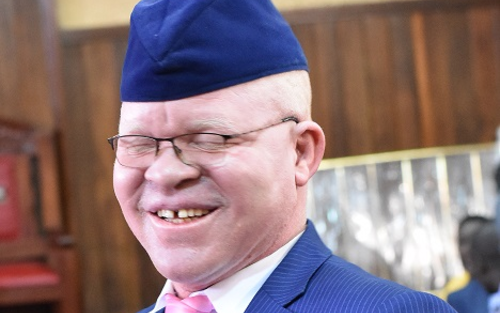Martin Wanyonyi of Ford Kenya was elected as the Member of Parliament (MP) for Webuye East Constituency in Bungoma County after garnering 12, 864 votes against his closest rival Wanjala Iyaya of DAP-K, who got 5,383 votes.
His election makes him the first person with albinism in Kenya's history to be elected to Parliament and the person with a disability to be elected in his constituency.
“This election is historic because it’s the first time that a person with albinism has been elected through the vote,” Wanyonyi said while addressing the media after being declared the winner.
Thanking his constituents for electing him, Wanyonyi acknowledged that the journey to the National Assembly was not an easy one for a person with disability due to stigma.
“It has not been an easy journey and people really looked down upon me. I am thankful that people have decided that this is my time,” he was quoted as saying by the Standard newspaper on August 10.
Before his election to Parliament, Wanyonyi served as a nominated Member of the County Assembly (MCA) representing persons with disabilities in Bungoma County Assembly since 2013. He was elected as the MCA for Ndivisi Ward, Bungoma County, in the 2017 elections.
Though he is the first person with albinism to be elected to the Kenyan Parliament, he will be the second person with such a disability to serve in a national legislative position. This is after Isaac Mwaura, who served as a Nominated MP and Senator representing persons with disabilities in the 11th and 12th Parliaments, respectively.
In the 13th Parliament, the Webuye East MP will serve alongside three others nominated to represent the interests of persons with disabilities. They include Jackson Kipkemoi Kosgei in the National Assembly, Crystal Kagehi Asige, and George Mungai Mbugua in the Senate.
Wanyonyi’s win is a feat worth celebrating, considering the stigma around albinism. The rare, non-contagious, and genetic condition results from the lack of pigment in the skin, eyes, and hair. Consequently, persons with albinism are vulnerable to sun exposure. They also face stigma, ritual killings, and social exclusion.
The stigma is evident in the United Nations General Assembly (UNGA) decision to pass resolution A/RES/69/170 in 2014, which proclaimed June 13 as International Albinism Awareness Day.
Further, as a testament to the myriad challenges persons with albinism face, especially in Africa, the African Commission on Human and People’s Rights endorsed the Regional Action Plan to End Attacks and Related Violations against Persons with Albinism in Africa (2017–2021).
The challenges notwithstanding, Wanyonyi's election to Parliament is a step in the right direction and an indication that the stigma towards the approximately 3,000 persons with the condition in Kenya is thawing.
To the National Council for Persons with Disabilities (NCPWD), his election is “a positive signal that the country’s democratic space is gradually providing an equal opportunity for persons with disabilities to aspire and lead.”

